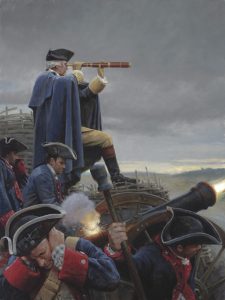David Gray, born in 1753 to Edward and Sarah Cook Gray, may be one of the lesser-known Grays of Tiverton, but played just as important a role in the American Revolution as his more famous relatives, Lt. Col. Pardon Gray (supply officer for the 10-12,000 Continental troops stationed in Tiverton), and Captain Robert Gray (privateer under George Washington during the War, and later was the first American to circumnavigate the globe, discovering the Columbia River that he named after his ship). David resided in the Fogland Ferry neighborhood of Tiverton, married to Nancy Corey.
David Gray was captured off the coast of Rhode Island by the British and sent to England and imprisoned there. He escaped and fled to France in 1778, and wrote to Benjamin Franklin who paid for his passage home.
Details of his War service come from his widow’s application for a pension in 1839 . . .
David Gray enrolled as a private in 1st Company militia on December 1, 1776, commanded by Captain Isaac Cook, Lieutenant Philip Corey, and Ensign Philip Manchester, belonging to Captain John Cook’s Regiment.
 “That in the Revolutionary war, from the 1st of said December 1776 up to the last of the year 1779, when the British evacuated Rhode Island, the said David acting as a private in said Company, did and performed duties devolving upon him as such, to wit in standing guard and protecting the shores at Tiverton from the enemy, then in possession of the Island, in divers tours and periods, in the aggregate for the full term of Eight months and that after the evacuation of the Island the enemy to wit from said last date up to the Last of October 1782 he did further, additional and like duties in ____ and detachments at Butts Hill and at Marstons point in the Regiment or otherwise commanded by Col. Church and Bailey the Full term of one months amounting in the whole to a period of nine moths service as a private _____ ______.”
“That in the Revolutionary war, from the 1st of said December 1776 up to the last of the year 1779, when the British evacuated Rhode Island, the said David acting as a private in said Company, did and performed duties devolving upon him as such, to wit in standing guard and protecting the shores at Tiverton from the enemy, then in possession of the Island, in divers tours and periods, in the aggregate for the full term of Eight months and that after the evacuation of the Island the enemy to wit from said last date up to the Last of October 1782 he did further, additional and like duties in ____ and detachments at Butts Hill and at Marstons point in the Regiment or otherwise commanded by Col. Church and Bailey the Full term of one months amounting in the whole to a period of nine moths service as a private _____ ______.”
David caught a disease “at sea on his passage home from the West Indies in the employ of Colonel J. Cook in a merchant vessel of which B. Borden was Master on or about the fall of 1783.”
William Cook, [Tiverton] Revolutionary pensioner, also testified that he was well acquainted with David Gray, verifying what his widow said about living at Fogland Ferry and rank and service of militia. He further detailed: “That soon after the British took possession of the Island, a British ship came into the river, and anchored near or at Fogland Ferry so called – that there was a considerable engagement had with her, in which a number were wounded, there was a company of Artillery the company commanded by Cap. Cook and other companies employed in it, that at this time . . . David Gray was then doing duty in said company – that on or about the time this company being formed being the first called into service, it was divided into two divisions which divisions did duty in standing guard alternately one every other month – that David Gray was in the division in which he ___ was that said David Gray so continued acting in said division and standing guard and protecting the shores, until he ____ went into the fifteen months service, which was about the first of June 1777.”
[Cook] went on to say that “David Gray was absent for a time at sea, in what service wheather in private state or national [he] could not say – nor could he state at what time precisely he returned – but he has reason to believe that he returned and was again serving in said company as before mentioned on or about the first of the spring of the year 1779 or before that he so continued said service till the British left the Island.”
Cook said he and David Gray were in a regiment commanded by Captain Church first & Bailey Lieutenant Colonel after the British left the Island, stationed at Butts Hill. David Gray was detached to Brentons point in 1781.
from “Descendants of Edward Gray”, located in the History Room of the Tiverton Public Library
